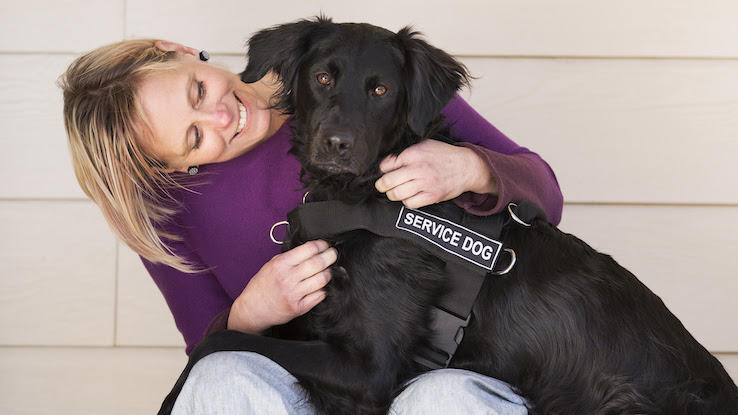How To Certify A Dog As A Service Animal

Many people with disabilities seek support from service animals. In addition to providing companionship, service animals are trained to perform tasks, from providing stability to picking up items to alerting individuals about environmental hazards.
Withal, in recent years, emotional support animals have also become more prominent. While both offering back up, at that place are stark differences between the two — especially when it comes to legal protections and training. Hither, we'll delve into the differences between service animals and emotional support animals, from the types of services they provide to the grooming they require.
How Emotional Support Animals Assistance People with Mental Illnesses and Disorders
An emotional support creature (ESA) is an fauna companion that helps support an private who is living with a mental illness or disorder. Most oftentimes, individuals ESAs are dogs, but other animals, from cats to miniature horses to lizards, tin all provide emotional back up and companionship. By providing companionship, these animals provide a sense of condolement for people with anxiety or depression. ESAs can also help folks who experience panic attacks or who live with feet disorders, such as post-traumatic stress disorder (PTSD) or obsessive-compulsive disorder (OCD).

Under the Americans with Disabilities Act (ADA), emotional back up dogs are not technically considered service dogs. While ESAs can be trained to support their owner, they don't ordinarily receive professional preparation, nor do they perform particular tasks. That is, providing comfort, while important, doesn't qualify every bit a service.
While ESAs no longer have legal protections on airplanes, many can receive certifications so that there's no disharmonize with an individual's housing state of affairs. Moreover, psychiatric service dogs, who are trained to perform tasks that mitigate a person's psychiatric condition, such as PTSD, differ from ESAs and accept more protections.
Legal Protection Is Express for an Emotional Back up Animal (ESA)
With emotional support animals becoming more than common, patients frequently asking letters of documentation supporting their need for an animal from their psychologist, therapist, or doctor. This official documentation of diagnosis is helpful to have on hand as validation, simply, unfortunately, ESAs and their owners still face limited legal protections and rights in public places.

While the ADA covers trained, professional service animals, it does non extend to emotional back up animals. In practice, this means that individuals with ESAs don't take unlimited access to public spaces. Depending on their own policies, businesses reserve the right to deny services to those with emotional support animals. As of January 2021, airlines are no longer required to adjust ESA owners, for example.
However, the Fair Housing Deed (FHA) requires landlords to allow renters to go along emotional support animals in their residence — even if pets aren't immune in the building. Under the FHA, landlords or property owners cannot require tenants to pay additional fees for ESAs. Additionally, they can't ask for all-encompassing information about a person's inability or request their medical records, nor can they require that the fauna take specific training.
Training Is a Must for Service Animals
Unlike ESAs, service animals are individually trained to perform specific tasks for people with physical, sensory, psychiatric, intellectual, and/or mental disabilities. For instance, guide dogs assist blind and low-vision individuals navigate public spaces as well as their homes. Service animals tin can also assistance open doors, conduct items and accomplish objects their owners may non be able to reach. Some of these trained animals can recognize the signs of seizures and will stand up guard over their possessor or effort and find them assistance.

The Americans with Disabilities Human activity (ADA) does not crave service dogs to be professionally trained, though it's certainly helpful. Individuals with disabilities tin can train their animals themselves, but sometimes professional grooming can go a long way. After all, it's important for service animals to remain calm, alarm, and reliable, particularly in unfamiliar settings.
Again, most service animals are dogs, and information technology can take up to two years for a canis familiaris to exist considered "properly trained" every bit a service animal. If you demand help finding a service dog, service dog agencies can help yous find an animal whose training aligns with the support you need. In public spaces, some service animals may wear special vests, harnesses, collars, or tags that identify their status as working dogs.
Service Animals Have Legal Protections
Under the Americans with Disabilities Act, service animals have many more legal protections than emotional support animals. Namely, this is because service animals are needed throughout the twenty-four hour period to aid with physical tasks. As a upshot, these animals go pretty much anywhere without the fear of being denied access.

Yep, service animals can be brought into restaurants, stores, libraries, and other public spots, even if pets aren't allowed. Service animals are fifty-fifty permitted on flights — though, typically, they must sit on the traveler'due south lap or at their anxiety. Though these animals tin certainly be affectionate companions, they aren't exactly pets. Later all, service animals are working animals, and they have very important jobs to do.
Just like with emotional back up animals, individuals with service animals tin acquire certifications wherein a doc or mental wellness professional person writes a letter that states their diagnosis and the way an brute will be benign.
Dog Breeds That Make Great Emotional Support and Service Animals
Certain canis familiaris breeds brand great emotional support and/or service animals based on their dispositions. Labrador retrievers, for case, are one of the about pop dog breeds when it comes to providing assistance, namely because they are naturally friendly, obedient and helpful. As you might look, golden retrievers are much the same.

Although known for existence protective guard dogs, German shepherds also make great service animals. Well-behaved and easy to train, their size, strength, and attention to particular brand them a nifty pick. Another great choice? The border collie. This intelligent herding breed enjoys beingness given a task, though they may accept a little more excess free energy than the other breeds on this list.
Resource Links:
- "How Long Does it Accept to Railroad train a Service Domestic dog?" via Official Service Dog, Therapy Dog & Emotional Back up Animal Registry
- "Which Breeds Make the Best Service Dogs?" via K9 of Mine
- "Service Dogs, Working Dogs, Therapy Dogs, Emotional Support Dogs: What's the Divergence?" via American Kennel Club (AKC)
- Ofttimes Asked Questions (FAQ) | The Americans with Disabilities Act (ADA) via The U.S. Section of Justice
- "No, the Fair Housing Deed of 1968 Didn't Stop Housing Bigotry in the U.S." via Reference
Source: https://www.symptomfind.com/healthy-living/emotional-support-animal-vs-service-animal?utm_content=params%3Ao%3D740013%26ad%3DdirN%26qo%3DserpIndex
Posted by: moodyoursend.blogspot.com

0 Response to "How To Certify A Dog As A Service Animal"
Post a Comment